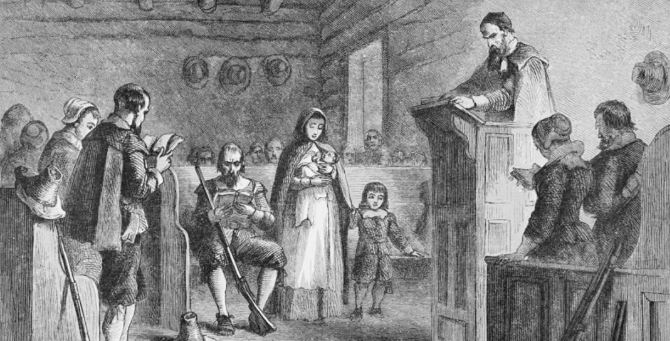Freedom—especially religious freedom—is a cornerstone of American identity. But it wasn’t always this way. In the 17th century, the Massachusetts Bay Colony, founded by Puritans seeking religious liberty, became a place where dissent was punished, and conformity was enforced. Enter Roger Williams, a man whose radical ideas about freedom and separation of church and state would eventually shape the foundation of American democracy.

Roger Williams, a brilliant linguist and theologian, arrived in Massachusetts in 1631. Unlike his Puritan peers, Williams believed in two revolutionary ideas: religious freedom and the separation of church and state. In an era when Europe was torn apart by religious wars, Williams argued that forcing faith on others was not only wrong but also “stank in God’s nostrils.” He insisted that government should have no authority over matters of conscience, a concept that was as shocking then as it is foundational today.
Williams’s ideas didn’t sit well with the Puritan leaders. After being banished from Massachusetts in 1635, he fled into the wilderness, where he was taken in by the Narragansett tribe. With their help, Williams founded Providence, a colony that would become a haven for religious dissenters. In 1644, he secured a charter for Rhode Island, ensuring its status as a place where all faiths—or no faith—were welcome. Williams even defended the rights of Quakers and Jews, groups often persecuted elsewhere.
But Williams wasn’t alone in his fight for freedom. Anne Hutchinson, another Puritan dissenter, challenged the male-dominated religious hierarchy by holding Bible studies and advocating for women’s spiritual equality. Like Williams, she was banished from Massachusetts and found refuge in Rhode Island. Hutchinson’s courage paved the way for future generations of women to claim their voice in public life.
Then there was Mary Dyer, a Quaker who defied Massachusetts’ anti-Quaker laws repeatedly, even facing execution for her beliefs. Dyer’s martyrdom in 1660 ultimately led to the loosening of restrictions on religious dissent in the colony. Her statue, alongside Hutchinson’s, now stands in front of the Massachusetts State House as a reminder of the high cost of freedom.
Cultural Impact and Modern Connections:
Roger Williams’s vision of religious freedom and the separation of church and state became enshrined in the First Amendment of the U.S. Constitution. His ideas, once considered radical, are now fundamental to American democracy. Rhode Island, though small in size, looms large in the history of liberty, serving as a model for a pluralistic society where diverse beliefs can coexist.
Today, the struggles of Williams, Hutchinson, and Dyer remind us that freedom is never free—it is fought for, often at great personal cost. Their legacy lives on in the ongoing debates about religious liberty, gender equality, and the role of government in private lives. As we navigate these issues in the modern world, we owe a debt to these early champions of freedom who dared to imagine a better way.

No comments yet.